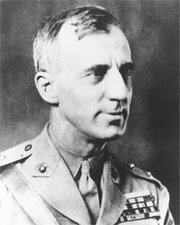
CYRANO'S JOURNAL®
Smedley Butler on InterventionismExcerpt from a speech delivered in 1933, by Major General Smedley Butler, USMC. |
http://www.cjonline.org
|
Our contributors' latest pieces
Gen. Butler, "the fighting Quaker" |
ALL RIGHTS RESERVED, 2005 CJONLINE.ORG & SPECIFIC AUTHORS. PLEASE SEE OUR COPYRIGHT NOTICE.
America has a long and honorable history of candid statements by some of its military leaders, a tradition now increasingly under siege by the corporatization of the American armed forces. In his final address to the nation in 1961, Eisenhower himself warned the public about the encroaching peril of the "military-industrial complex". Ike's words resonate today, but it is Maj. Gen. Smedley Butler's words which are forever inscribed in a class of their own for their candor, accuracy, and courage. In telling it like it is, Gen. Butler is a credit to the U.S. military. We are happy to reproduce his statements here as their relevancy, far from vanishing, has actually grown since he first uttered them.War is just a racket. A racket is best described, I believe, as something that is not what it seems to the majority of people. Only a small inside group knows what it is about. It is conducted for the benefit of the very few at the expense of the masses.
I believe in adequate defense at the coastline and nothing else. If a nation comes over here to fight, then we'll fight. The trouble with America is that when the dollar only earns 6 percent over here, then it gets restless and goes overseas to get 100 percent. Then the flag follows the dollar and the soldiers follow the flag.
I wouldn't go to war again as I have done to protect some lousy investment of the bankers. There are only two things we should fight for. One is the defense of our homes and the other is the Bill of Rights. War for any other reason is simply a racket.
There isn't a trick in the racketeering bag that the military gang is blind to. It has its "finger men" to point out enemies, its "muscle men" to destroy enemies, its "brain men" to plan war preparations, and a "Big Boss"— Super-Nationalistic-Capitalism.
It may seem odd for me, a military man to adopt such a comparison. Truthfulness compels me to. I spent thirty- three years and four months in active military service as a member of this country's most agile military force, the Marine Corps. I served in all commissioned ranks from Second Lieutenant to Major-General. And during that period, I spent most of my time being a high class muscle- man for Big Business, for Wall Street and for the Bankers. In short, I was a racketeer, a gangster for capitalism.
I suspected I was just part of a racket at the time. Now I am sure of it. Like all the members of the military profession, I never had a thought of my own until I left the service. My mental faculties remained in suspended animation while I obeyed the orders of higher-ups. This is typical with everyone in the military service.
I helped make Mexico, especially Tampico, safe for American oil interests in 1914. I helped make Haiti and Cuba a decent place for the National City Bank boys to collect revenues in. I helped in the raping of half a dozen Central American republics for the benefits of Wall Street. The record of racketeering is long. I helped purify Nicaragua for the international banking house of Brown Brothers in 1909-1912 (where have I heard that name before?). I brought light to the Dominican Republic for American sugar interests in 1916. In China I helped to see to it that Standard Oil went its way unmolested.
During those years, I had, as the boys in the back room would say, a swell racket. Looking back on it, I feel that I could have given Al Capone a few hints. The best he could do was to operate his racket in three districts. I operated on three continents.
Smedley Darlington Butler (July 30, 1881–June 21, 1940), nicknamed "the fighting Quaker" and "Old Gimlet Eye," was a Major General in the U.S. Marine Corps and at the time of his death the most decorated marine in U.S. history. Butler was twice the recipient of the Medal of Honor, one of only 19 to be so honored; he is noted for his outspoken left-wing views and his book War is a Racket, one of the first works describing the military-industrial complex. An immensely popular figure in the United States at the time, Butler led the Bonus Army and came forward to the U.S. Congress in 1933 to report that a failed coup had been plotted by wealthy industrialists to overthrow the government of President Franklin D. Roosevelt with the help of General Butler, though no evidence of such a plot outside of his personal testimony was ever presented. This scandal is known as the Business Plot.For the full bio of Gen. Butler, see the Wikipedia entry under his name. |
